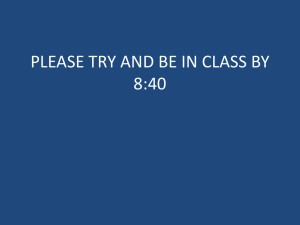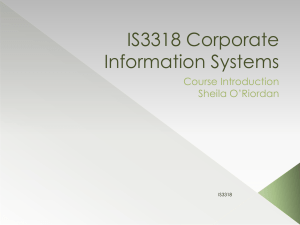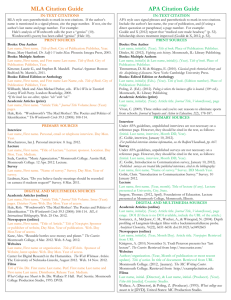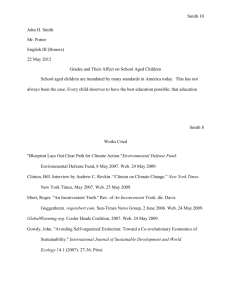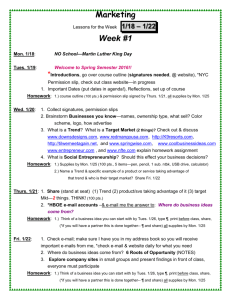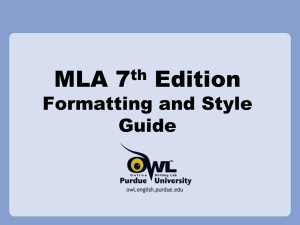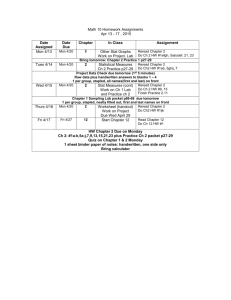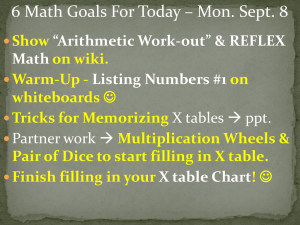MLA Citation Guide
advertisement
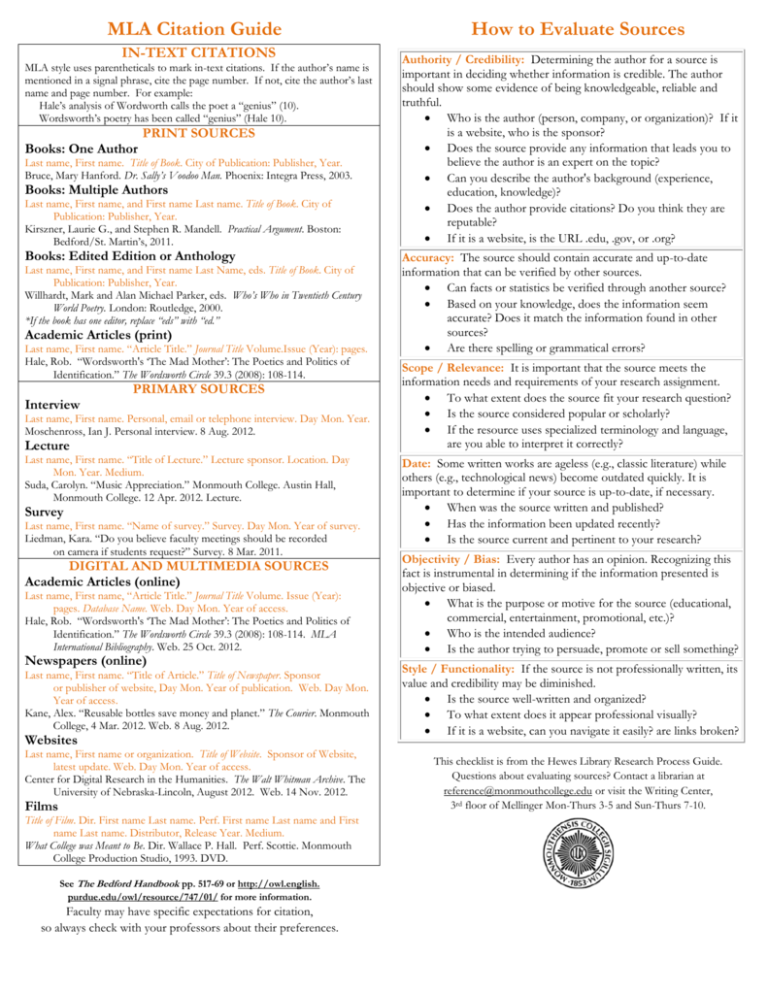
MLA Citation Guide IN-TEXT CITATIONS MLA style uses parentheticals to mark in-text citations. If the author‟s name is mentioned in a signal phrase, cite the page number. If not, cite the author‟s last name and page number. For example: Hale‟s analysis of Wordworth calls the poet a “genius” (10). Wordsworth‟s poetry has been called “genius” (Hale 10). Books: One Author PRINT SOURCES Last name, First name. Title of Book. City of Publication: Publisher, Year. Bruce, Mary Hanford. Dr. Sally’s Voodoo Man. Phoenix: Integra Press, 2003. Books: Multiple Authors Last name, First name, and First name Last name. Title of Book. City of Publication: Publisher, Year. Kirszner, Laurie G., and Stephen R. Mandell. Practical Argument. Boston: Bedford/St. Martin‟s, 2011. Books: Edited Edition or Anthology Last name, First name, and First name Last Name, eds. Title of Book. City of Publication: Publisher, Year. Willhardt, Mark and Alan Michael Parker, eds. Who’s Who in Twentieth Century World Poetry. London: Routledge, 2000. *If the book has one editor, replace “eds” with “ed.” Academic Articles (print) Last name, First name. “Article Title.” Journal Title Volume.Issue (Year): pages. Hale, Rob. “Wordsworth's „The Mad Mother‟: The Poetics and Politics of Identification.” The Wordsworth Circle 39.3 (2008): 108-114. Interview PRIMARY SOURCES Last name, First name. Personal, email or telephone interview. Day Mon. Year. Moschenross, Ian J. Personal interview. 8 Aug. 2012. Lecture Last name, First name. “Title of Lecture.” Lecture sponsor. Location. Day Mon. Year. Medium. Suda, Carolyn. “Music Appreciation.” Monmouth College. Austin Hall, Monmouth College. 12 Apr. 2012. Lecture. Survey Last name, First name. “Name of survey.” Survey. Day Mon. Year of survey. Liedman, Kara. “Do you believe faculty meetings should be recorded on camera if students request?” Survey. 8 Mar. 2011. DIGITAL AND MULTIMEDIA SOURCES Academic Articles (online) Last name, First name, “Article Title.” Journal Title Volume. Issue (Year): pages. Database Name. Web. Day Mon. Year of access. Hale, Rob. “Wordsworth's „The Mad Mother‟: The Poetics and Politics of Identification.” The Wordsworth Circle 39.3 (2008): 108-114. MLA International Bibliography. Web. 25 Oct. 2012. Newspapers (online) Last name, First name. “Title of Article.” Title of Newspaper. Sponsor or publisher of website, Day Mon. Year of publication. Web. Day Mon. Year of access. Kane, Alex. “Reusable bottles save money and planet.” The Courier. Monmouth College, 4 Mar. 2012. Web. 8 Aug. 2012. Websites Last name, First name or organization. Title of Website. Sponsor of Website, latest update. Web. Day Mon. Year of access. Center for Digital Research in the Humanities. The Walt Whitman Archive. The University of Nebraska-Lincoln, August 2012. Web. 14 Nov. 2012. Films Title of Film. Dir. First name Last name. Perf. First name Last name and First name Last name. Distributor, Release Year. Medium. What College was Meant to Be. Dir. Wallace P. Hall. Perf. Scottie. Monmouth College Production Studio, 1993. DVD. See The Bedford Handbook pp. 517-69 or http://owl.english. purdue.edu/owl/resource/747/01/ for more information. Faculty may have specific expectations for citation, so always check with your professors about their preferences. How to Evaluate Sources Authority / Credibility: Determining the author for a source is important in deciding whether information is credible. The author should show some evidence of being knowledgeable, reliable and truthful. Who is the author (person, company, or organization)? If it is a website, who is the sponsor? Does the source provide any information that leads you to believe the author is an expert on the topic? Can you describe the author's background (experience, education, knowledge)? Does the author provide citations? Do you think they are reputable? If it is a website, is the URL .edu, .gov, or .org? Accuracy: The source should contain accurate and up-to-date information that can be verified by other sources. Can facts or statistics be verified through another source? Based on your knowledge, does the information seem accurate? Does it match the information found in other sources? Are there spelling or grammatical errors? Scope / Relevance: It is important that the source meets the information needs and requirements of your research assignment. To what extent does the source fit your research question? Is the source considered popular or scholarly? If the resource uses specialized terminology and language, are you able to interpret it correctly? Date: Some written works are ageless (e.g., classic literature) while others (e.g., technological news) become outdated quickly. It is important to determine if your source is up-to-date, if necessary. When was the source written and published? Has the information been updated recently? Is the source current and pertinent to your research? Objectivity / Bias: Every author has an opinion. Recognizing this fact is instrumental in determining if the information presented is objective or biased. What is the purpose or motive for the source (educational, commercial, entertainment, promotional, etc.)? Who is the intended audience? Is the author trying to persuade, promote or sell something? Style / Functionality: If the source is not professionally written, its value and credibility may be diminished. Is the source well-written and organized? To what extent does it appear professional visually? If it is a website, can you navigate it easily? are links broken? This checklist is from the Hewes Library Research Process Guide. Questions about evaluating sources? Contact a librarian at reference@monmouthcollege.edu or visit the Writing Center, 3rd floor of Mellinger Mon-Thurs 3-5 and Sun-Thurs 7-10.
